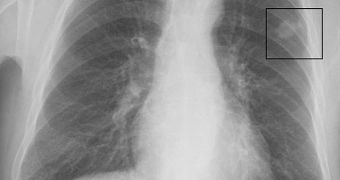A collaboration of scientists identified more than 480 molecules in the human bloodstream, whose concentrations change when a person develops lung cancer. The correlation is either positive or negative, but it's there in most cases, experts say.
In other words, concentrations of a specific molecule may increase in the bloodstream as the condition develops, whereas concentrations of other molecules may drop. In either case, these levels experience fluctuations that are well outside normal boundaries, the team behind the new work explains.
The research effort was led by professor Dr. Joachim L. Schultze, who is based at the University of Bonn Life and Medical Sciences Institute (LIMES), in Germany. Details of the study appear in the latest issue of the scientific journal Clinical Cancer Research.
Possibly the most important finding in the new study is the fact that these molecules exhibit varying concentrations even if the lung cancer is still in its earliest stages. Current classifications recognize four stages of lung cancer.
“In lung cancer patients, typical patterns which can be detected with a measuring program thus emerge,” Schultze says, adding that all the molecules researchers analyzed in the new study are in fact nucleic acids.
They are produced in the body when the information contained in genes is transcribes. In a sense, experts say, they could be thought of as waste products, Science Blog reports.
“The prognosis for patients in stage 3 and 4 is still very poor even today; even with the most modern therapies, the point of death can only be postponed,” the team leader explains. However, this is not the case with stage 1 cancers.
According to Schultze, there is a great chance that a patient will survive lung cancer if the disease is caught at stage 1. Surgeries conducted at this point are oftentimes successful, and the disease does not relapse. But the problem is that there's only a narrow window of opportunity.
“Today, however, a tumor is seldom detected so early, namely in only about 15% of all cases. If a simple screening blood test would increase this percentage, a large proportion of lung cancer patients could survive,” the expert explains.
“It was important to us that a subsequent test not only be able to differentiate lung cancer patients from healthy subjects, but also from persons with chronic lung diseases,” he adds about some of the challenges that his group had to face while conducting its research over the years.

 14 DAY TRIAL //
14 DAY TRIAL //